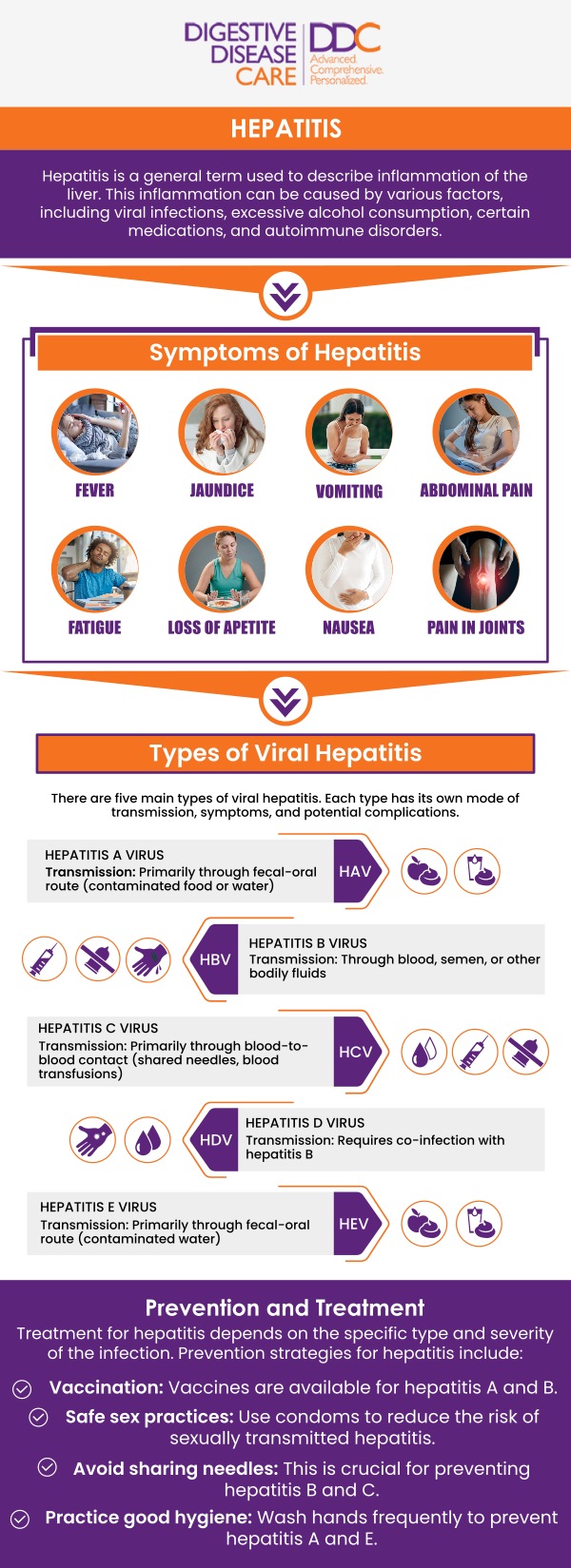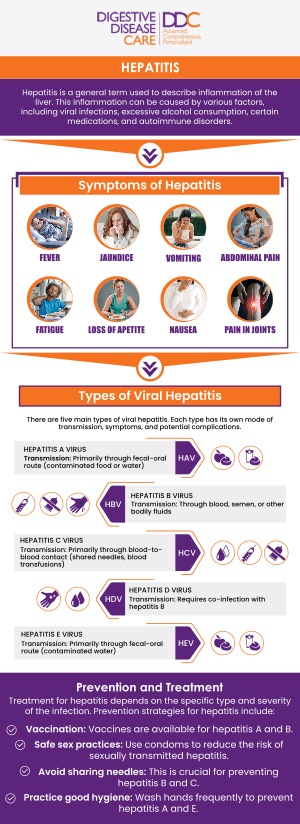Autoimmune Hepatitis Treatment Q&A
Autoimmune hepatitis is a chronic liver disease where the immune system mistakenly attacks the liver, causing inflammation and potential damage. It can lead to symptoms like fatigue, jaundice, and abdominal pain, and may progress to cirrhosis if left untreated. At Digestive Disease Care (DDC), our team of board-certified doctors provides professional diagnosis and personalized treatment to manage symptoms and prevent liver damage. For more information, please contact us or book an appointment online. We have convenient locations to serve you in Babylon NY, East Setauket NY, Forest Hills NY, Jericho NY, Lake Success NY, Melville NY, Mineola NY, Massapequa NY, New Hyde Park NY, and Riverhead NY.


Table of Contents:
What is Autoimmune Hepatitis?
What causes Autoimmune Hepatitis?
How is Autoimmune Hepatitis diagnosed?
What are the common symptoms of Autoimmune Hepatitis?
Autoimmune hepatitis is a chronic liver disease where the immune system mistakenly attacks the liver cells, causing inflammation and liver damage. Unlike other liver conditions, autoimmune hepatitis is not caused by infections, alcohol use, or fatty liver disease, but by an immune system malfunction. It can affect individuals of any age, but is more common in women. Left untreated, autoimmune hepatitis can progress to cirrhosis, liver failure, or liver cancer.
There are two main types of autoimmune hepatitis:
• Type 1: The most common form, typically seen in both adults and children. It may be associated with other autoimmune disorders like rheumatoid arthritis or thyroid disease.
• Type 2: Less common and typically diagnosed in children between the ages of 2 and 14. This form may have a more aggressive progression.
Autoimmune hepatitis often develops gradually, and symptoms may not be noticeable at first. It can occur along with other autoimmune diseases, complicating the diagnosis. Early detection is crucial to managing the disease and preventing complications like cirrhosis. Treatment involves medications to suppress the immune response and reduce liver inflammation, often leading to remission in many cases. Regular monitoring is necessary to assess liver function and prevent long-term damage.
The exact cause of autoimmune hepatitis remains unknown, but it is believed to result from a combination of genetic and environmental factors that trigger an immune response against the liver. In a healthy immune system, the body defends itself from harmful invaders like bacteria and viruses. In autoimmune hepatitis, however, the immune system attacks the liver cells, mistaking them for foreign pathogens.
Possible causes and risk factors include:
• Genetics: A family history of autoimmune diseases or autoimmune hepatitis increases the risk of developing the condition. Specific genetic markers, such as certain HLA (human leukocyte antigen) genes, are associated with a higher likelihood of the disease.
• Environmental triggers: Viral infections, such as hepatitis A, B, or C, may serve as triggers for autoimmune hepatitis in genetically predisposed individuals.
• Medications: Some drugs can provoke an immune reaction, leading to autoimmune hepatitis.
• Other autoimmune diseases: Autoimmune hepatitis is more common in people who have other autoimmune conditions, such as rheumatoid arthritis, lupus, or type 1 diabetes.
• Hormonal factors: Women are more likely than men to develop autoimmune hepatitis, suggesting that hormonal differences may play a role in the disease’s development.
While no single factor causes autoimmune hepatitis, these risk factors can increase the likelihood of developing the condition. Understanding the triggers is essential in managing the disease and minimizing flare-ups.
Diagnosing autoimmune hepatitis involves a series of tests to rule out other liver conditions and confirm the presence of an immune-mediated liver disease. A doctor will perform a thorough medical history review, physical examination, and laboratory tests to aid in diagnosis. Blood tests play a central role, as they can detect specific markers associated with autoimmune diseases.
Steps in diagnosing autoimmune hepatitis include:
• Blood tests:
Liver function tests: Measure levels of liver enzymes like ALT, AST, and bilirubin to assess liver damage.
Autoantibodies: These include anti-smooth muscle antibodies (SMA), anti-nuclear antibodies (ANA), and anti-liver kidney microsomal antibodies (LKM), which are often present in autoimmune hepatitis.
Immunoglobulin levels: Increased levels of immunoglobulin G (IgG) are commonly seen in people with autoimmune hepatitis.
• Liver biopsy: In some cases, a liver biopsy may be performed to assess the extent of liver damage and confirm inflammation caused by an autoimmune response.
• Imaging tests: Ultrasound or CT scans may be used to evaluate liver size, texture, and the presence of scarring or cirrhosis.
• Rule out other conditions: The doctor will rule out other liver diseases, including viral hepatitis and fatty liver disease, to ensure an accurate diagnosis.
Diagnosing autoimmune hepatitis can be complex, as its symptoms often overlap with other liver conditions. However, once confirmed, treatment can begin promptly to manage the disease and prevent liver damage.
The symptoms of autoimmune hepatitis can vary widely, ranging from mild discomfort to severe, life-threatening conditions. In some cases, there may be no symptoms at all in the early stages, making the disease harder to detect. As the condition progresses, inflammation and liver damage can lead to more noticeable signs.
Common symptoms include:
• Fatigue: One of the most frequent symptoms, caused by the body’s immune system fighting against liver cells.
• Jaundice: Yellowing of the skin and eyes due to high levels of bilirubin in the bloodstream, a sign of liver dysfunction.
• Abdominal pain: Typically in the upper right side of the abdomen, where the liver is located.
• Nausea and vomiting: These symptoms may occur due to liver dysfunction or as a result of medication side effects.
• Loss of appetite: A reduced desire to eat, often accompanied by weight loss.
• Dark urine: Caused by an excess of bilirubin in the body.
• Joint pain: Some patients experience pain or swelling in the joints, which is common in autoimmune diseases.
• Itchy skin: A symptom related to the buildup of bile in the bloodstream.
• Fever: Low-grade fever can occur when the immune system is actively attacking the liver.
In more advanced cases, when cirrhosis or liver failure occurs, symptoms may worsen and lead to severe complications such as bleeding, confusion, or swelling of the abdomen (ascites). Early detection and treatment are critical to prevent these complications and improve long-term outcomes. For more information, please contact us or book an appointment online. We have convenient locations to serve you in Babylon NY, East Setauket NY, Forest Hills NY, Jericho NY, Lake Success NY, Melville NY, Mineola NY, Massapequa NY, New Hyde Park NY, and Riverhead NY.

Check Out Our 5 Star Reviews


Additional Services You May Like

Additional Services You May Like
- Abdominal Pain
- Acid Reflux
- Barretts Esophagus
- Bloating
- Capsule Endoscopy
- Celiac Disease
- Colon Cancer Screening
- Colonoscopy
- Constipation
- Crohns Disease
- Diarrhea
- Diverticulitis
- Esophageal PH Monitoring
- Fatty Liver
- Fibroscan
- Gallstones
- Gastroenterologist
- Gastric Chest Pain
- Gluten Intolerance
- Hemorrhoid
- Hemorrhoid Banding
- Hepatitis
- Irritable Bowel Syndrome
- Lactose Intolerance
- Pancreatitis
- Polyps
- Rectal Bleeding
- Stomach
- Ulcerative Colitis
- GI Urgent Care





